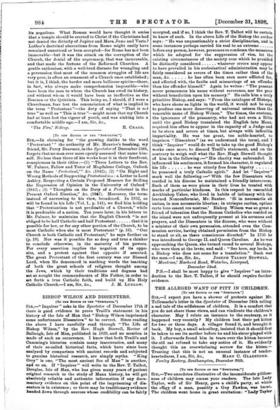BISHOP WILSON AND DISSENTERS.
[To TH2 EDITOR Or TH1 " Brzerrroa]
Sin,—" Inquirer" asks in the Spectator of December 17th if there is good evidence to prove Traill's statement in his history of the Isle of Man that "Bishop Wilson imprisoned some unfortunate Dissenters" to be correct. Since reading the above I have carefully read through "The Life of Bishop Wilson," by the Rev. Hugh Stowell, Rector of Ballaugb, Isle of Man, published in 1829, and no mention is made of such an occurrence. I know that both Trail's and Cumming's histories contain many inaccuracies, and many of their so-called historical facts, which have since been analysed by comparison with ancient records and subjected to genuine historical research, are simply myths. "King Orry " is one, "The most ancient See of Man" is another, and so on. If " Inquirer " will write to the Rev. T. Talbot, Douglas, Isle of Man, who has given many years of patient original research to the study of Manx history, he will get absolutely reliable and authentic information if any docu- mentary evidence on this point of the imprisoning of dis- senters is in existence ; or there may be traditionary evidence handed down through sources whose credibility can be fairly accepted, and if so, I think the Rev. T. Talbot will be certain to know of such. In the above Life of the Bishop the author says : He was unquestionably a strict disciplinarian, and in some instances perhaps carried his zeal to an extreme ...... before any person, however, presumes to condemn the measures which he adopted for the suppression of vice, let the existing circumstances of the society over which he presided be distinctly considered whatever errors may appear to have prevailed in his ecclesiastical administration may be fairly considered as errors of the times rather than of the man, 44,:c he has often been seen more afflicted for, and affected with, the faults and miscarriage of an offender than the offender himself." Again he writes : "The peasant never pronounces his name without reverence, nor the poor without benediction upon his memory." He calls him a truly primitive Bishop, and says : "From the catalogue of Bishops, who have shone as lights in the world, it would not be easy to produce one more deserving of universal esteem than the venerable name of Bishop Wilson." The times, the customs, the ignorance of the peasantry, who had not even a Bible until the good Bishop translated the English into Manx, required him often to appear in the capacity of a Judge and to be stern and severe at times, but always with inflexible impartiality. He was too great, too noble-hearted, to imprison "Dissenters" (as we understand the term), and I think "Inquirer" would do well to take up the good Bishop's works once more, to discard Trail's statement, and on the contrary to weigh well what the Rev. Hugh Stowell thought of him in the following :—" His charity was unbounded. It influenced his sentiments, it formed his character, it regulated his life he was utterly free from bigotry he possessed a truly Catholic spirit." And let "Inquirer" mark well the following :—" With the few Dissenters who resided in his diocese he maintained a friendly intercourse. Such of them as were pious in their lives he treated with marks of particular kindness. In this respect he resembled Archbishop Usher, who lived in habits of intimacy with the learned Nonconformist, Mr. Baxter. Si in neoessariis sit unites, in non necessariis libertas; in utrisque caritas, optimo certe loco essent res nostrae.' Bishop Wilson was so great a friend of toleration that the Roman Catholics who resided on the island were not unfrequently present at his sermons and prayers, and the Dissenters in the diocese, who were without a minister of their own persuasion, attended even the Com- munion service, having obtained permission from the Bishop to stand or sit, as there consciences directed." In 1735 he was introduced to George II. and Queen Caroline. As be was approaching the Queen, she turned round to several Bishops, who were then at the lev6e, and said : "See here, my lords, is a Bishop who does not come for a translation." Such waa December 22nd.
P.S.—I shall be most happy to give "Inquirer" an intro- duction to the Rev. T. Talbot, if he should require further evidence.


































 Previous page
Previous page